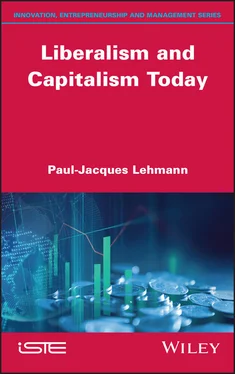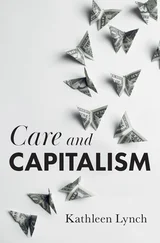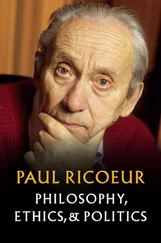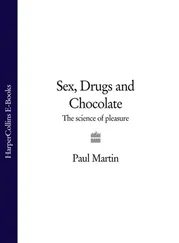Liberalism is based on individual interest, the homo oeconomicus : each individual seeks to maximize their own well-being. This mainly functions based on a belief in the observation of laws drawn from observation and knowledge of the facts that govern trade. Admittedly, these laws cannot be approached in the same way as those found in the physical sciences. They simply mean that the behavior of individuals in their economic activities leads, in any place and at any time, to certain inexorable consequences of which the course cannot be changed. It is customary to say that economic principles are truths that people have been able to extract from experience; for example, that the freedom of work and exchange on which capitalism is based promotes economic growth.
As we will see, capitalism emphasizes the spirit of enterprise. Its consequence – risk-taking – can only be envisaged in a market economy; that is, a decentralized and deregulated economy, as opposed to a planned economy, which allows competition to take place in most sectors of activity and transactions of goods and services to be carried out according to the prices resulting from the confrontation of supply and demand. Indeed, free play of the market makes it possible to achieve an optimal balance of competition, which means that it is not possible to improve the situation of one agent without worsening that of another, and that this is the only way to satisfy economic agents as much as possible and to make the best possible use of available resources.
The market economy should not be confused with market economics, which stems from the segmentation of the market into its various components according to the nature of the products traded. For example, we can talk about the automobile market, the oil market, the financial market and so on.
1.1.2. The reduced role of the state and different positions in relation to monopolies
The role of the state in the city has always been a hotly debated question, especially in times of crisis. The liberal state should be a state of law and liberties. Back in his time, Adam Smith asserted that any intervention by the state undermines individual liberties, since the protection of some undermines the security of the community. An entire study followed to explain that it is not up to the public authorities to decide to protect, or worse, to over-protect citizens. They must let them take their lives into their own hands, by choosing the initiatives they deem necessary; that is, they must make them responsible, because favoring a few people often hinders the freedom of a greater number.
Opposition to the increasing intervention of the state in economic life is very present in de Tocqueville, for whom the search for the elimination of social inequalities leads above all to the inevitable strengthening of the role of state power, which is the only real power and which is never impartial, since those in power always seek to obtain the vote of as many voters as possible. Moreover, simply being in a democratic nation does not preclude the state from becoming tyrannical. In an environment conducive to public intervention, as soon as economic agents feel that the market does not meet their expectations, they turn to the state, because they know that there is a chance that it will satisfy their demands, even the least justified ones. New social categories will then follow suit, with people believing it legitimate to imitate those who have obtained satisfaction in order to benefit, in turn, from advantages hitherto reserved for others. The demands become all the more pressing as special interest groups grow in importance: the acceptance of a certain level of protection multiplies the demands for protection.
Thus, when satisfaction is granted to more and more citizens, the question arises as to whether public authorities, given their capacity for constraint, are seeking anything other than achieving an economic optimum. Some even go so far as to argue that the state’s desire to reduce inequalities and its behavior as a seemingly impartial arbitrator in settling certain conflicts are merely pretexts for its insidious and increasing involvement in the lives of citizens. For example, by regulating a market, the state favors either a company, which excludes all competition, or consumers, which puts certain companies at risk.
However, even the most intransigent liberals accept that public authorities carry out a minimum number of activities, qualified as regalian: those that only the state is capable of carrying out. All of them take up the arguments developed by philosophers such as Hobbes and Locke 1 , who explained that individuals must give up their freedom in favor of the sovereign, today’s rulers, in exchange for the guarantee of being assured of living in an environment where order reigns and where their interests are preserved. However, Adam Smith, trusting the “invisible hand”, explained that the state must fulfill only three missions: “the duty of protecting the society from violence and invasion of other independent societies; secondly the duty of protecting, as far as possible, every member of the society from the injustice or oppression of every other member of it, or the duty of establishing an exact administration of justice; and, thirdly, the duty of erecting and maintaining certain public works and certain public institutions which it can never be for the interest of any individual, or small number of individuals, to erect and maintain; because the profit could never repay the expense to any individual or small number of individuals” (Smith 2007, p. 533).
It is up to the state to ensure the inviolability of property and the respect of all rights, both nationally and internationally. Public security, that is, everything related to police operations, defense, diplomacy and justice, is thus devolved to the public authorities, so that citizens are in a position to exercise their other prerogatives as effectively as possible. However, they must always act within the limits determined by the law: they must be given specific tasks that they must not overstep.
Hayek 2 , a contemporary Austrian liberal author, took up these ideas by explaining that the state must set totally transparent rules that prevent citizens’ actions from coming into conflict and that protect each individual from coercion or invasion of their free sphere by others. Thus, the authority of public authorities should not be exercised over individual activities, even for apparently legitimate and justified reasons, except in cases of trade-distorting fraud. Indeed, private law and the freedom to contract must be permanently protected, without entrusting a central institution with the right to enforce them, because any interventionism can only lead to the disruption of free trade.
For Hayek (1944), justice is simply an attribute of the human condition, which means that it makes no sense to talk about a just or unjust economic order. Therefore, guaranteeing the social well-being of citizens and ensuring social justice should not be the prerogative of public authorities, which should not substitute rights and claims for freedom – a condition of economic equilibrium. Otherwise, unbalanced interventions will follow, because individuals are then led to behave in a way that is unnatural, and therefore cannot be optimal: “To follow socialist morality would be tantamount to annihilating most of the men making up present-day humanity and impoverishing the vast majority of those who would survive”.
For extreme liberals in politics, capitalism can only function in the best possible way if it does not go beyond this minimum: the state must intervene as little as possible in the economic field. However, it can be said, without much risk of contradiction, that no liberal has ever demanded that all economic operations be left in the hands of the markets. Thus, again, for Hayek, public power must ensure the vital minima for all citizens in the areas of food, housing, health, etc., and the state must be able to provide them with a minimum level of services. However, it should not go further, for example, by guaranteeing material equality among all, because social order should not be based on the results obtained by the activities carried out, but on the remuneration of the conduct of the various economic actors. It is illegitimate for a government to use coercion to determine an income scale that corrects distortions of competition by providing a uniform gain to all those who, for one reason or another, are unable to obtain this income on the market.
Читать дальше












